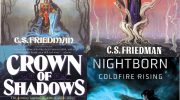 Uncommon Purpose, P. J Strebor’s debut mystery science fiction novel published by Tickety Boo Press, is currently collecting top reviews over on Amazon and Goodreads. If the cover doesn’t give it away, Uncommon Purpose a can be found fighting for elbow room with its comrades on the Military Science Fiction shelves. The first in The Hope Island Chronicles asks the untried Nathan Telford to rise to the challenge of saving the Athenian Republic, but not before he puts his life of servitude behind him.
Uncommon Purpose, P. J Strebor’s debut mystery science fiction novel published by Tickety Boo Press, is currently collecting top reviews over on Amazon and Goodreads. If the cover doesn’t give it away, Uncommon Purpose a can be found fighting for elbow room with its comrades on the Military Science Fiction shelves. The first in The Hope Island Chronicles asks the untried Nathan Telford to rise to the challenge of saving the Athenian Republic, but not before he puts his life of servitude behind him.
Welcome to SFFWorlds, Phil. Elements of Uncommon Purpose have been compared to Robert Heinlein’s work as well as C.S. Forester’s Hornblower novels, I can even see a comparison to The Expanse. As a debut author do you find these comparisons helpful or does it just add to the pressure when writing sequels?
Great first question, Shellie. And thanks for the invite. I grew up with the Hornblower novels so it was inevitable that such an influence would have to seep into my work. Basically, I’ve only ever wanted to write a decent yarn. As for the comparisons. Ha. Let’s face it, I could do worse than being compared to Heinlein and Forester, couldn’t I? It’s extremely flattering but, I think, a little misplaced.
Earth naval history is something that your protagonist Nathan Telford has an interest verging on obsession with. When writing Nathan how often are you sucked into researching historical battles on behalf of your character?
In that respect, I am Nathan. That is, I have had a fascination with war, since I was a kid. Not a love of war, far from it, but an interest in cause and effect. The great naval battles of World War 2, and what was at stake for the losers, and how history could have been drastically changed if the battles went another way. That, I find to be endlessly fascinating.
There is a vast amount of space covered, including massively powerful ships trying to outmanoeuvre one another. Lacking their future tech, how did you go about keeping track of both the human elements of the plot, pace, and who is where, when.
Another good question. Hmm, there isn’t a short answer to that, so I’ll say this. Fifteen years ago, I hurled a book across the room, in disgust. “I could write something better than that crap,” I declared. “I mean, how hard could it be?” Plenty hard, I’ll tell you. For ten years I toiled away, with zero support. I wrote three novels and binned them all. But each failure taught me something. So, when I finally discover writing sites, I was fairly confident of being hailed as the next big thing. Wrong. Three years later, I corrected all of my rookie mistakes and sent the book out. It wasn’t going to get any better. That is the current book, Uncommon Purpose. Publishing is a brutal game but I hoped for some small measure of interest. I didn’t get one bit of positive feedback and the book collected dust for two years. Then I answered a query from my current publisher and he accepted by MS. Great, I thought, the hard work’s over. Wrong. The book was finally published eight months later. I could write a book about that experience but I’d have to put in under the horror fiction genre.
Before I put one word down, I determined that this would be, first and foremost, a close human book. I’ve found a lot of SF to be distancing and cold in this regard, and I wanted people to care about these characters. I can only hope I’ve succeeded. As for the logistics. Time and effort and countless rewrites.
Talking of re-writes… First draft, editing, re-editing, synopsis writing, marketing. Many authors hate one part of the writing process more than another. With ten books planned in The Hope Island Chronicles, which part of the process would you remove if you could?
None. I might not be happy about certain aspects, but hey, if you want to be a writer, it comes with the territory. Book 2 is with my editor now, and he will, no doubt raise a few issues I’ve missed.
Nathan Telford is clearly an easy character to write, but were any of the Uncommon Purpose characters difficult to capture in words?
Hmm, some characters were a little over the top, like Manson, and I had to tone him down, a lot. As for hard to write? There was only one chapter that caused me heartache. When people read the book I think they’ll know which one. It took me into unfamiliar territory and I had to dig deep for that one, which needed to be highly emotive. I took a deep breath, and ran it past my editor. Thankfully, he got back to me quickly and said, “Don’t touch a word of this or I’ll track you down.”
No spoilers, but in Uncommon Purpose Nathan discovers he has a unique talent. If you could have one superpower, (just one, no cheating!) what would you choose and why. (NB. Summoning multi-wish genies, rings containing fairies, and the power to time travel also not allowed!)
Ha, no multi wishes. Okay, if I had one power it would be the ability to selectively read minds. If that sounds a little creepy then let me say this. I’ve been an observer of people my whole life. With that ability I could learn more about the human condition in a year than I could do in several lifetimes.
Finally, before we return you to your writing desk, can you tell us what else you’re working on?
Book 2, First Comes Duty. It’s fighting me, but not as hard as the first one. It’s still a very human story but the canvas is a lot larger, the stakes much, much higher. Hopefully people will like it.
Thanks Phil! Uncommon Purpose is available in ebook format from Amazon, with audio versions and paperback due later in 2016.
*****
Interview by Shellie Horst – SFFWorld.com © 2016




